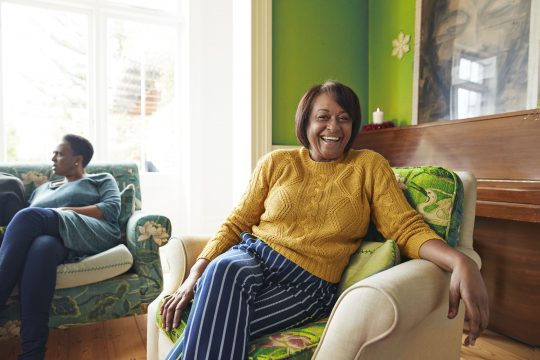It’s a good question – but for many people, the answer is ‘no’. You have to be over 55 to take money out of your pension savings, and this is going up to 57 in 2028.
Anyone who tells you it’s possible to take money out of your pension savings without being at least 55 is a scammer. If you took your money before age 55, HM Revenue and Customs would treat it as an unauthorised payment and you’d get a huge tax bill.
Can debt collectors take your pension?
No. Your creditors (the people you owe money to) can’t touch your pension savings – whether you’re over 55 or not.
Even if your creditors put pressure on you to take money out of your pension savings, you don’t have to. If you do take money out, your creditors may be able to insist it’s used to pay off your debt. But as long as it stays in your pension, it’s safe.
So, can you use pension to pay off debt? Only if you’re over 55. And once you’ve paid the money, you won’t have it to use in your retirement – which could leave you worse off in the future.
There are other ways to deal with debt. Let’s take a closer look.
You’re not alone
Some debt is normal. Almost everyone has some kind of debt – mortgages, credit card bills and car loans, for example. It’s when it starts to get out of control that it becomes a problem. And the level of debt in the UK is getting bigger.
Figures from The Money Charity show people in the UK owed £1,842.6 billion at the end of June 2023. This was £36.9 billion higher than at the end of June 2022 when it was £1,805.7 billion – an extra £791 per UK adult over the year. At the same date, the average credit card debt per UK household was £2,363.
And research last year by Tesco Bank found just over a quarter of the people surveyed (26%) thought they’d be starting 2023 in debt. Among people aged 18 to 34 it was nearer to half (43%). And a third (33%) of the people in the survey said the cost-of-living crisis has added to debts they already had.
Almost a quarter (23%) of the people in the Tesco Bank survey said talking about their debts would make them feel shame and embarrassment. Almost one-fifth (18%) said they would never tell anyone they were in debt.
But anyone can get into problem debt. You’re not alone.
What’s the best way to deal with debt?
Don’t wait! It may be hard to face. But not dealing with your debts will only make them worse. Working out exactly how much you owe, and who you owe it to, is the first step.
It can be overwhelming to see an actual figure. But knowing the amount of your debts, how much interest you pay, what type of debts they are and who you owe them to gives you the power to do something about it. Act now!
Work out what you owe and what you spend
- Make a list of all the bills you need to pay each month and how much money you have coming in.
- Look at your bank statements and see where your money goes.
Check your priorities
You’ll want to focus on paying off your highest-priority debts first. Which debts have the highest priority for you depends on:
- how badly they affect you
- how much interest you pay, and
- what could happen if you don’t pay the bills on time.
For example:
- not paying your rent or mortgage means you could lose your home
- not paying your gas or electricity bills means your supply could be cut off (although not water in the UK)
- parking ticket fines can get bigger the longer you go without paying them, and
- credit card bills can build up through interest.
Look for ways to reduce your outgoings
- If you live alone you may be entitled to a discount on your council tax.
- If you don’t already have a water meter, getting one fitted could lower your water bills. You can use this water meter calculator to work out if you’d save money.
- Can you shop around to get things like gas, electricity or broadband cheaper?
- Can you switch to lower interest rates on your credit cards or loans? This could make your regular payments smaller.
Could you boost your income?
- Are you getting all the benefits you’re entitled to? Many people aren’t. Estimates suggest the amount of unclaimed benefits could be around £15 billion a year. Use the Turn2us Benefits Calculator or Policy in Practice’s Better Off Calculator to see if there’s anything you should be claiming. You may be able to get help with some bills – check if your local council has a ‘welfare assistance’ or ‘household support’ fund.
- You could think about selling things you no longer need or use and putting the money towards paying your debt off sooner.
Once you know what you need to pay and what you have coming in, you can make a plan to pay off your debts.
Talk to the people you owe money to.
- Most creditors will be willing to make an arrangement with you, even if it’s only paying off small amounts over a long time.
- It’s best to do this sooner rather than later.
- Make sure you offer to pay an amount you can manage each month or week.
- Speak to your creditors again if your circumstances change.
How to get help with debt
If you are stuck or don’t know where to start, these charities offer direct help free of charge, online or by phone. They can help you make a plan to pay off your debts.
- Stepchange Debt Charity 0800 138 1111 (Monday to Friday 8am-8pm, Saturday 8am-4pm)
- National Debtline 0808 808 4000 (Monday to Friday 9am-8pm, Saturday 9.30am-1pm)
These organisations have lots of information on dealing with debt and managing money.
- MoneyHelper has a section on dealing with debt and a Living on a squeezed income feature, which includes a step-by-step guide to getting on top of your money.
- Citizens Advice has a section on debt with details about debt solutions and sample letters to send to creditors.
NP/B0052/09/2023





